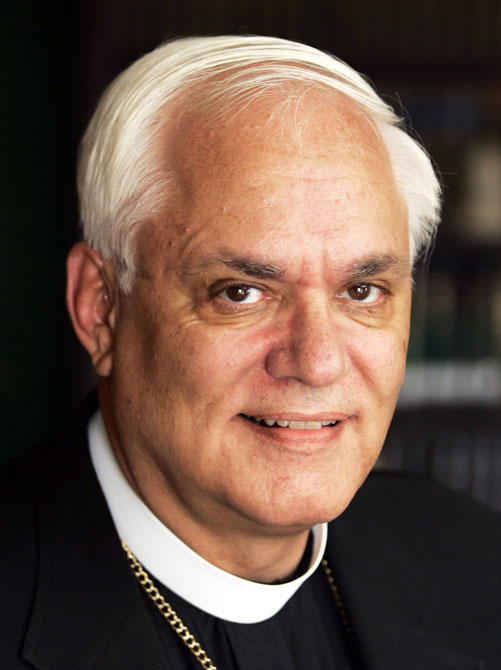National church expected to OK ceremonies, but heavily gay parish hasn’t requested permission from conservative local leader Stanton
ANNA WAUGH | Staff Writer
The heavily LGBT congregation at The Episcopal Church of St. Thomas the Apostle likely won’t be able to bless same-sex relationships even if a resolution allowing the blessings passes at the July General Convention in Indianapolis.
Bishops will decide whether to allow the blessings in their dioceses, making Dallas parishes doubt that they’ll be performing them anytime soon.
The Rev. Stephen Waller, openly gay rector at St. Thomas, said he hasn’t even requested permission from the Dallas bishop to perform the blessing because he doesn’t think it would be granted.
“We would not be given such permission by our diocese,” Waller said. “I can’t speak for the bishop, but I suspect he will toe the line and not grant permission. Our bishop has been pretty clear that he didn’t want to do that.”
Dallas Diocese Bishop James Stanton didn’t return calls this week requesting a comment about the resolution.
Despite the Episcopal Church moving forward in its acceptance of LGBT members — ordaining openly gay priests in the ’90s and later a gay bishop in 2003 and a lesbian bishop in 2010 — the Dallas diocese has remained conservative.
Although Waller won’t be at the convention and is unsure whether the resolution will even pass, he said it is something he will wait for the church to decide on before moving forward.
“This is a decision the church has been working on for years and years and years,” he said. “I want the church to continue to do its work until it comes to some common mind about it, so that’s what I’m waiting on is for the church to speak at convention.”
Katie Sherrod, a spokeswoman for the Episcopal Diocese of Fort Worth, will represent the diocese as a deputy at the convention.
Each diocese will send four clergy delegates, known as deputies, and four lay people to the convention July 5-12 along with the bishop. Sherrod said each deputy is expected to vote based on their conscience, not how their diocese wants them to vote.
Sherrod said Episcopalians have always been more progressive among Protestant faiths, passing several similar resolutions in part since 2000. This year, she expects it to pass.
“I hope and I truly do expect this resolution will pass and I think so because the groundwork has been so carefully laid down in the church,” she said.
In the ’70s, the general convention passed a resolution that stated gay people were children of God and deserve pastoral care the church offers, she said. Advocates within the church for the full inclusion of LGBT people have been expanding the acceptance ever since.
“What we are trying to do is include in as many ways as we can all of the people of the church in the life and worship of the church, and that includes our LGBT members as well,” Sherrod said.
The resolution titled “Authorize Liturgical Resources for Blessing Same-Gender Relationships” was proposed by the Standing Commission on Liturgy and Music.
Sherrod said it explicitly outlined that the blessing would be allowed in states where gay marriage or civil unions were allowed, but instead changed it to include all states based on the local bishop’s permission.
The blessing symbolizes the sacrament of marriage, Sherrod said, and doesn’t legally bind the couple. Instead, it holds the committed couple up in the church and blesses their union, she said.
The Fort Worth diocese broke apart in 2008 when its former bishop left the church because of its highly conservative, anti-gay views, Sherrod said. While the diocese is still wrapped up in a legal battle for the title of the diocese and its property, it has a provisional bishop, the Rt. Rev. C. Wallis Ohl.
Ohl wrote in an email to Dallas Voice that he would handle the blessings on a case-by-case basis. He didn’t mention if he would vote for or against the resolution.
“If the resolution passes, it will not go into effect until January 2013. I will be retiring (for the second time) in November at our diocesan convention. It will be up to the next provisional bishop of the diocese to decide whether and how he or she will make use of the generous pastoral care referenced in the resolution,” he wrote. “In the meantime, I have told our clergy that all cases involving such blessings will be handled on a case by case basis while I am in office.”
The Rt. Rev. Andy Doyle, bishop of the Texas Diocese, granted permission to perform the blessing to St. Stephen’s Episcopal Church in Houston’s heavily gay Montrose area and to St. David’s in Austin. They may perform them beginning in December after they complete a congregational study, spokeswoman Carol Barnwell wrote in an email.
Barnwell added that while Doyle plans to vote against the resolution, his response was based on pleasing both opinions within the church after he wrote a 120-page paper detailing the rites. She added that about only nine of the diocese’s 153 churches are expected to perform them.
“With what we learn from these two churches we will refine how we offer blessings and allow more churches to offer them,” she wrote. “Most of our churches will opt to take no action, whether to request the ability to offer blessings, or state that they will not offer blessings. A majority of our diocese is very traditional, even though we do have more liberal members/congregations.”
This article appeared in the Dallas Voice print edition June 15, 2012.


